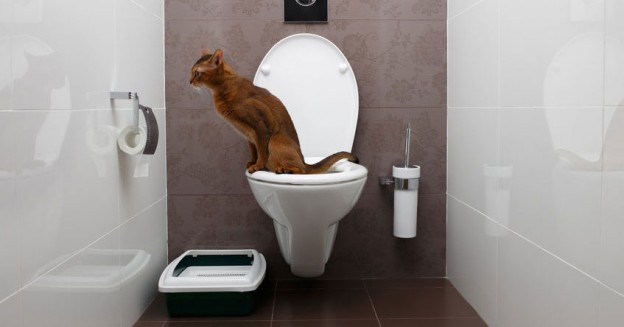The content following next on the subject of Can You Flush Cat Poo or Litter Down the Toilet? is exceptionally intriguing. You should read it.

Introduction
As pet cat owners, it's vital to bear in mind exactly how we take care of our feline buddies' waste. While it may appear practical to flush pet cat poop down the toilet, this method can have damaging repercussions for both the setting and human wellness.
Environmental Impact
Purging feline poop introduces damaging virus and bloodsuckers into the water, posturing a substantial threat to water ecological communities. These impurities can negatively influence aquatic life and compromise water quality.
Wellness Risks
Along with environmental problems, purging feline waste can additionally posture health risks to humans. Feline feces may have Toxoplasma gondii, a parasite that can create toxoplasmosis-- a potentially severe disease, especially for expectant ladies and individuals with weakened body immune systems.
Alternatives to Flushing
The good news is, there are more secure and much more responsible ways to dispose of feline poop. Think about the following options:
1. Scoop and Dispose in Trash
The most usual method of dealing with feline poop is to scoop it into a naturally degradable bag and toss it in the trash. Be sure to use a committed clutter inside story and get rid of the waste promptly.
2. Use Biodegradable Litter
Go with biodegradable cat trash made from products such as corn or wheat. These clutters are eco-friendly and can be safely gotten rid of in the garbage.
3. Hide in the Yard
If you have a backyard, take into consideration burying pet cat waste in a designated location away from veggie gardens and water resources. Make certain to dig deep adequate to stop contamination of groundwater.
4. Mount a Pet Waste Disposal System
Buy a pet dog garbage disposal system particularly developed for feline waste. These systems utilize enzymes to break down the waste, lowering smell and environmental effect.
Verdict
Accountable pet dog possession expands past supplying food and shelter-- it additionally entails correct waste monitoring. By avoiding flushing cat poop down the commode and opting for different disposal approaches, we can decrease our ecological footprint and safeguard human health.
Why Can’t I Flush Cat Poop?
It Spreads a Parasite
Cats are frequently infected with a parasite called toxoplasma gondii. The parasite causes an infection called toxoplasmosis. It is usually harmless to cats. The parasite only uses cat poop as a host for its eggs. Otherwise, the cat’s immune system usually keeps the infection at low enough levels to maintain its own health. But it does not stop the develop of eggs. These eggs are tiny and surprisingly tough. They may survive for a year before they begin to grow. But that’s the problem.
Our wastewater system is not designed to deal with toxoplasmosis eggs. Instead, most eggs will flush from your toilet into sewers and wastewater management plants. After the sewage is treated for many other harmful things in it, it is typically released into local rivers, lakes, or oceans. Here, the toxoplasmosis eggs can find new hosts, including starfish, crabs, otters, and many other wildlife. For many, this is a significant risk to their health. Toxoplasmosis can also end up infecting water sources that are important for agriculture, which means our deer, pigs, and sheep can get infected too.
Is There Risk to Humans?
There can be a risk to human life from flushing cat poop down the toilet. If you do so, the parasites from your cat’s poop can end up in shellfish, game animals, or livestock. If this meat is then served raw or undercooked, the people who eat it can get sick.
In fact, according to the CDC, 40 million people in the United States are infected with toxoplasma gondii. They get it from exposure to infected seafood, or from some kind of cat poop contamination, like drinking from a stream that is contaminated or touching anything that has come into contact with cat poop. That includes just cleaning a cat litter box.
Most people who get infected with these parasites will not develop any symptoms. However, for pregnant women or for those with compromised immune systems, the parasite can cause severe health problems.
How to Handle Cat Poop
The best way to handle cat poop is actually to clean the box more often. The eggs that the parasite sheds will not become active until one to five days after the cat poops. That means that if you clean daily, you’re much less likely to come into direct contact with infectious eggs.
That said, always dispose of cat poop in the garbage and not down the toilet. Wash your hands before and after you clean the litter box, and bring the bag of poop right outside to your garbage bins.
https://trenchlesssolutionsusa.com/why-cant-i-flush-cat-poop/

I'm certainly very fascinated with Can You Flush Cat Poo or Litter Down the Toilet? and I am praying you appreciated the new post. Don't hesitate to take the opportunity to promote this write-up if you enjoyed reading it. I am grateful for your time. Please come by our site back soon.
Visit Website